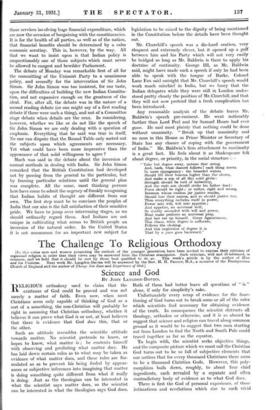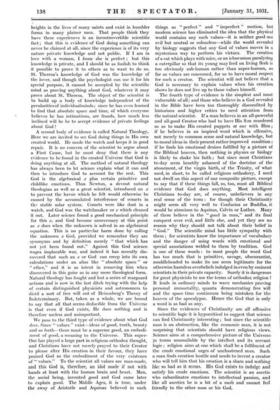The Challenge To Religious Orthodoxy
[In thL3 sz,ries men and women presenting the outlook of the younger generation have been invited to express their criticism of organized religion in order that their views may be answered from the Christian standpoint. Such criticism, well and ill-informed, is common, and we hold that it should be met by those best qualified to do so. This week's article is by the author of Man and his Universe. Next week Mr. Langdon-Davies will be answered by the Rev. H. H. Farmer, M.A., a minister of the Presbyterian Church of England and the author of Things Not Seen and Experience of God.]
Science and God
BY JOHN LANGDON-DAVIES.
RELIGIOUS orthodoxy used to claim that the existence of God could be proved and was not merely a matter of faith. Even now, when most Christians seem only capable of thinking of God as a sort of a something, the non-Christian will probably be right in assuming that Christian orthodoxy, whether it believes it can prove what God is or not, at least believes that there is evidence that God does this, that or the other.
Such an attitude resembles the scientific attitude towards matter. No scientist pretends to know, or hopes to know, what matter is ; he contents himself with observing and predicting what matter does. He has laid down certain rules as to what may be taken as evidence of what matter does, and these rules are for- mulated so as to prevent his being fooled by appear- ances or subjective inferences into imagining that matter is doing something quite different from what it really is doing. Just as the theologian can be interested in what the scientist says matter does, so the scientist can be interested in what the theologian says God does, Both of them had better leave all questions of " is " alone, if only for simplicity's sake.
Unfortunately every scrap of evidence for the func- tioning of God turns out to break some or all of the rules which scientists find necessary for obtaining evidence of the truth. In consequence the scientist distrusts all theology, orthodox or otherwise, and it is as absurd to suggest that science and religion can travel along common ground as it would be to suggest that two men starting out from London to find the North and South Pole could travel together as far as the equator.
To begin with, the scientist seeks objective things, and the composite picture which we must call the Christian God turns out to be so full of subjective elements that one notices that for every thousand Christians there seem to be a thousand Christian Gods. However, this poly- morphism boils down, roughly, to about four chief ingredients, each revealed by a separate and often contradictory body of evidence as to what God does.
There is first the God of personal experience, of those intimations and revelations which rise to such vivid heights in the lives of many saints and exist in humbler forms in many plainer men. That people think they have these experiences is an incontrovertible scientific fact; that this is evidence of God doing something can never be claimed at all, since the experience is of its very nature private knowledge and not public. If I am in love with a woman, I know she is perfect ; but this knowledge is private, and I shOuld be as foolish to think it possible to prove it to others as to want to do so. St. Theresa's knowledge of God was the knowledge of the lover, and though the psychologist can use it for his special purpose, it cannot be accepted by the scientific mind as proving anything about God, whatever it may prove about St. Theresa. The object of the scientist is to build up a body of knowledge independent of the pecularities of individual minds ; since he has even learned to find that absolute space and time, of which everyone believes he has intimations, are frauds, how much less inclined will he be to accept evidence of private feelings about God A second body of evidence is called Natural Theology. Here we are invited to see God doing things in His own created world. He made the watch and keeps it in good repair. It is no concern of the scientist to argue about a First Cause, but he must deny that there is any evidence to be found in the created Universe that God is doing anything at all. The method of natural theology has always been to let science explain what it can and then to introduce God to account for the rest. This God is the algebraical x plus certain primitive and childlike emotions. Thus Newton, a devout natural theologian as well as a great scientist, introduced an x to prevent the havoc which he felt would otherwise be caused by the accumulated interference of comets in tin stable solar system. Comets were like dust in a watch, and God was the watchmaker or x which cleaned it out. Later science found a good mechanical principle for this x, and God became unnecessary at this point as x does when the unknown is solved in an algebraical equation. This is no particular harm done by calling the unknown x God, provided we remember they are synonyms and by definition merely " that which has not yet been found out." Against this God science wages implacable war, and indeed it has recently dis- covered that such an x or God can creep into its own calculations under an alias like " absolute space " or "ether," and it is as intent in removing him when discovered in this guise as in any more theological form. Natural theology has fought and lost a series of rearguard actions and is now in the last ditch trying with the help of certain distinguished physicists and astronomers to distil a sort of free will out of Heisenberg's Theory of Indeterminacy. But, taken as a whole, we are bound to say that all that seems deducible from the Universe is that even if God exists, He does nothing and is therefore useless and unimportant.
We pass to the third type of evidence about what God does. Since " values " exist—ideas of good, truth, beauty and so forth—there must be a supreme good, an embodi- ment of good, a meaning to the Universe. This super- One has played a large part in religious orthodox thought, and Christians have not merely prayed to their Creator to please alter His creation in their favour, they have praised God as the embodiment of the very existence of " values." To the scientist all values are man-made, and this God is, therefore, an idol made if not with hands at least with the human brain and heart. Man, the social being, invented good and God came later to explain good. The Middle Ages, it is true, under the sway of Aristotle and Aquinas believed in such things as " perfect " and " imperfect " motion, but modern science has eliminated the idea that the physical World contains any such values—it is neither good nor evil but neutral or colourless—while the world revealed by biology suggests that any God of values moves in a mysterious way to perform his virtues. The creation of a cat which plays with mice, or an ichneumon paralysing a caterpillar so that its young may feed on living flesh is too obviously sub-human rather than super-human, as far as values are concerned, for us to have moral respect for such a creator. The scientist will not believe that a God is necessary to explain values when his creation shows he does not live up to those values himself.
The fourth type of evidence is the simplest and most vulnerable of all ; and those who believe in a God revealed in the Bible have been too thoroughly discomfited by historians and higher critics to need attention from the natural scientist. If a man believes in an all-powerful and all-good Creator who had to have His Son murdered so as to make His created puppets at one with Him ; if he believes in an inspired word which is offensive, not merely to common sense and natural knowledge, but to moral ideas in their present rather improved condition ; if he finds his emotional desires fulfilled by a picture of the Biblical heaven, then nothing in physics or biology is likely to shake his faith ; but since most Christians to-day seem heartily ashamed of the doctrine of the atonement, of the virgin birth, of the Trinity, of what used, in short, to be called religious orthodoxy, I need not dwell on this aspect of our composite picture, except to say that if these things fall, so, too, must all Biblical evidence that God does anything. Most intelligent Christians to-day are, of course, unbelievers in any real sense of the term : for though their Christianity might seem all very well to Confucius or Buddha, it would be atrocious to Aquinas, Calvin or Luther. Many of them believe in the " good in man," and its final conquest over evil, and little else, and yet they see no reason why they should not talk about their belief in " God." The scientific mind has little sympathy with them ; for scientists know the importance of vocabulary and the danger of using words with emotional and special associations welded to them by tradition. God is one of these words : to most people the word God has too much that is primitive, savage, obscurantist, muddleheaded to make its use seem legitimate for the otherwise harmless overbeliefs indulged in even by eminent scientists in their private capacity. Surely it is dangerous for great physicists to use the terms of orthodox religion !
It leads in ordinary minds to wave mechanics proving personal immortality, quanta demonstrating free will and the space time continuum being mistaken for 'the heaven of the apocalypse. Hence the God that is only a word is as bad as any.
Since the evidences of Christianity are all offensive to scientific logic it is hypocritical to suggest that science can find Christianity interesting ; but since the scientific man is an abstraction, like the economic man, it is not surprising that scientists should have religious views.
Science aims at a comprehensive picture of the Universe in terms unassailable by the intellect and its servant logic ; religion aims at one which shall be a fulfilment of the crude emotional urges of unchastened man. Such a man finds creation hostile and needs to invent a creator who will tell him that his creation is a sham and nothing like so bad as it seems. His God exists to indulge and satisfy his crude emotions. The scientist is an ascetic who subordinates emotions to intellectual passion, and like all ascetics he is a bit of a snob and cannot feel friendly to the other man or his God,







































 Previous page
Previous page